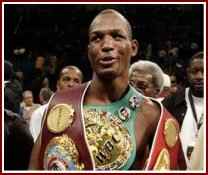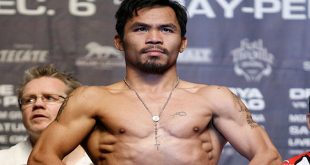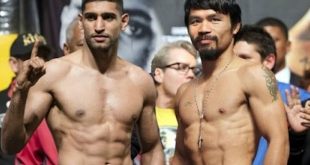 |
It is a sobering thought, but perhaps Felix Trinidad’s reign of fire through the middleweight divisions would never have existed had he taken on Ronald Wright all those years ago. Of course, Trinidad devised another course, as did so many others, except Fernando Vargas, and the consensus is |
that even the “Ferocious” one required a little external assistance to secure the verdict. Wright’s glory is long overdue, but his story, the enduring drama of the perennially overlooked and undervalued finally reaching the pinnacle of achievement is one that pleases the masses but a short time. The industry values Wright’s talent, but it craves the entertainment found in thrilling efforts and unexpected stoppages, of which the ailing form of Diego Corrales at ringside sparked remembrance. When the fervor over Wright’s victory subsides, many will understand what it truly represents, and that is the perfect reason that Bernard Hopkins might elude him and seek out more attractive alternatives. Wright won a fight against Trinidad, but he did not beat him. The eternal drawback of Wright’s scintillating technique is its distinct lack of excitement, which in turn fails to inspire the public, yielding less money while affirming the element of risk in the minds of potential opponents.
Anyone surprised at Trinidad’s humiliating loss either did not know, or simply wanted to forget the lessons administered to him in previous fights with Oscar de la Hoya and Bernard Hopkins. Wright’s commanding jab served as the antidote to Trinidad’s volcanic offense from beginning to end, and the slightest lapse from Wright, encouraging Trinidad to land cleanly fell against Wright’s defense that appeared to be hermetically sealed. It now materializes that Trinidad will retire from boxing; the only logical recourse I could find for him in the fight’s aftermath. Of course, because of the nature of contrasting styles, Trinidad could continue and be successful, but against Wright, Felix Trinidad, a fighter once known as an inevitable force, came and went, and for the first time, it was as if he was never even there. Furthermore, I must protest against assertions that Wright enjoyed one of his easiest nights in defeating Trinidad. Simple as it looked, Wright knew the peril before him and deserves ample credit for maintaining the discipline and concentration required to beat a man who would surely have ended him otherwise.
Unfair as it may seem and despite all his good character and virtues as a fighter, Ronald Wright will never become a household name. Wright can never hold a place in the affections of boxing fans, nor command vast sums of money; it was telling that in the post-fight clamor, Wright’s call for a rematch was the loudest even though he won the fight beyond any doubt. Wright knows that without a Trinidad, Hopkins, Vargas or De La Hoya, he can never hope to be any more than an outstanding technical boxer in an industry that is consistently unappreciative of his efforts. There is no solution for Wright here, and nor should there be. Wright endures negative reaction concerning his style, but it is what brings him now to this ultimate point. A positive alteration of attitude towards Wright should occur, an evaluation of our expectations instead of demands for Wright to satiate misguided criticism. Nevertheless, Wright, undoubtedly inspired to box by men that did not simply win, but forced the world to notice them through heroic feats in the ring, fails to give as much of himself to boxing than does Barrera, Morales, Castillo, Corrales or Gatti, and as such, he must appreciate what validity there is in the accusations forced upon him.
Wright’s supposedly solid installation as a number one contender in the ever-unsteady vision of the WBC will notlikely thrill him. Years of misplacement and ultimately being ripped off by sanctioning organizations should instill in Wright a sense of insecurity, especially as our current undisputed middleweight champion nears retirement and is reportedly eyeing an historic final fling with the winner of the Glen Johnson-Antonio Tarver light heavyweight rematch occurring later this year. Jermain Taylor receives a chance at Hopkins, and it is a fight gathering interest not merely because the young student versus the old master is a great selling point, but because many people actually believe that with his style and perhaps the right timing, Taylor might be able to win. Wright’s cause however, as the nice guy finally given his chance is somewhat less appealing. Public outcry will not likely favor Hopkins vs. Wright, given the negative nature of their respective styles. Wright may never get the chance to gatecrash Hopkins’ farewell tour, especially as he just proved himself quite apt to ruining the best-laid plans of a world elite fighter.
One suggestion for Wright is to do what every fighter alive wishes to: secure a fight with Oscar de la Hoya. Wright was canny enough to talk his way into a few million more than Don King felt he was worth, and while there is still plenty of time for De La Hoya to grow into an unscrupulous exploiter of fighters in King’s wake, he is not there yet. And forget the talk of De La Hoya returning to the welterweight division while he is still playing promoter and handily filling out those designer suits. Unlikely as it seems, Wright-De La Hoya is a possibility for the following reasons. Above all else, De La Hoya’s monstrous ego desires revenge for the losses suffered throughout his career; he cannot acquire it against Hopkins, politics denied him it against Mosley and “Sugar” Shane does not deserve another handout. Trinidad is retired, therefore, to beat Wright, especially hot on the heels of Wright’s domination of Trinidad offers De La Hoya a slice of that vicarious vengeance that has eluded him thus far. Wright-De La Hoya is a competitive fight that can happen at 154 or 160-pounds and carries great incentive for both men: monetary gain for Wright for whom true adoration will not arrive, and glory for De La Hoya who seeks it above all else and can afford such an indulgence.
Wright won the undisputed light middleweight title and saw it systematically taken away from him piece by piece, he should remember from that experience the many fleeting loyalties this industry harbors. Even by defeating Hopkins and becoming the undisputed middleweight champion of the world, Wright cannot change what he is, and what he is will never translate into suitable compensation for a man of his talents as long as he intends to chase glory. Wright stood in the shadows long enough and if he cannot hope for immortality, perhaps he can lend his brilliance as a boxer into negotiations, and finally retire from boxing in greater luxury than he ever dreamed possible.
Jim Cawkwell can be reached at jimcawkwell@yahoo.co.uk
 Boxing News Boxing News
Boxing News Boxing News






